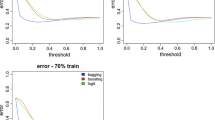Abstract
For auditors, a key concern is the reliability and quality of the auditing opinion’s final decision. The emerging topic of machine learning in auditing is being increasingly explored by developing trusted and efficient algorithms for classifying auditing opinions. The prediction of audit opinions of Egyptian listed companies is crucial to the security market risk mitigation process. Numerous innovations might be put into practice to raise audit efficiency, improve audit quality, and enhance auditor insight by using machine learning techniques. The aim of this paper is to provide a new audit opinion prediction model for financial statements. To this end, a sample of a group of listed Egyptian companies was selected. The model was trained with the aid of auditor opinion labels using two widely used supervised machine learning classifiers (SVM—Support Vector Machine and NV—Naive Bayes). The obtained results were then compared with the trained model that uses the clustering outcomes as a new relative auditor opinion. The results show that the developed method managed to predict the audit opinion with accuracy rates of 83.7 and 83.9 %, respectively. The performance evaluated in terms of overall prediction accuracy, and the Type I and Type II error rates show that the SVM models have higher results than the Naïve Bayes models. This study indicates that traditional methods have a poor performance using two traditional techniques (logistic and probit regressions).
Access this chapter
Tax calculation will be finalised at checkout
Purchases are for personal use only
Similar content being viewed by others
References
Özcan A (2016) Determining factors affecting audit opinion: Evidence from Turkey. Int J Acc Financ Rep 6(2):45–62
Zeng S, Li Y, Li Y (2022) Research on audit opinion prediction of listed companies based on sparse principal component analysis and kernel fuzzy clustering algorithm. Math Probl Eng 1
Saif SM, Sarikhani M, Ebrahimi F (2012) Finding rules for audit opinions prediction through data mining methods. Eur Online J Nat Soc Sci 1(2):28–29
Huang F, No WG, Vasarhelyi MA, Yan Z (2022) Audit data analytics, machine learning, and full population testing. J Finance Data Sci
Ucoglu D (2020) Current machine learning applications in accounting and auditing. Press Acad Procedia 12(1):1–7
Alareeni B (2019) A review of auditors’ GCOs, statistical prediction models and artificial intelligence technology. Int J Bus Ethics and Gov 2(1):19–31
Awad SS, Wathik IM (2022) Using data mining tools to prediction of going concern on auditor opinion-empirical study in iraqi commercial. Acad Account Financ Stud J 26(S3):1–13
Sánchez-Serrano JR, Alaminos D, García-Lagos Callejón-Gil AM (2020) Predicting audit opinion in consolidated financial statements with artificial neural networks. Mathematics 8(8)
Ha TT, Nguyen TAT, Nguyen TT (2016) Factors influencing the auditor’s going–concern opinion decision. Int Days Stat Econo 10:1857–1870
Sánchez-Medina AJ, Blázquez-Santana F, Alonso JB (2019) Do auditors reflect the true image of the company contrary to the clients’ interests? An artificial intelligence approach. J Bus Ethics 155(2):529–545
Zarei H, Yazdifar H, Dahmarde Ghaleno M (2020) Predicting auditors opinions using financial ratios and non-financial metrics: evidence from Iran. J Account Emerg Econ 10(3):425–446
Adler HM, Suhartono D, Hutahayan B, Halimawan N (2023) Probability bankruptcy using support vector regression machines. J Appl Finance Bank 13(1):13–25
Cao M, Chychyla R, Stewart T (2015) Big data analytics in financial statement audits. Account Horiz 29(2):423–429
Bakumenko A, Elragal A (2022) Detecting anomalies in financial data using machine learning algorithms. Systems 10:130. https://doi.org/10.3390/systems10050130
Manglani R, Bokhare A (2021) Logistic regression model for loan prediction: a machine learning approach, Emerging trends in industry 4.0 (ETI 4.0) pp 1–6. https://doi.org/10.1109/ETI4.051663.2021.9619201
Guo J, Gao J (2022) Comparison of different machine learning algorithms on cell classification with scRNA-seq after principal component analysis. In: 2022 7th international conference on intelligent computing and signal processing (ICSP) pp 1476–1479. https://doi.org/10.1109/ICSP54964.2022.9778439
Dai T, Dong Y (2020) Introduction of SVM related theory and its application research. In: 2020 3rd international conference on advanced electronic materials, computers and software engineering (AEMCSE) pp 230–233. https://doi.org/10.1109/AEMCSE50948.2020.00056
Wang Q (2022) Support vector machine algorithm in machine learning. In: 2022 IEEE international conference on artificial intelligence and computer applications (ICAICA) pp 750–756. https://doi.org/10.1109/ICAICA54878.2022.9844516
Ibraheem MR, El-Sappagh S, Abuhmed T, Elmogy M (2020) Staging melanocytic skin neoplasms using high-level pixel-based features. Electronics 9:1443. https://doi.org/10.3390/electronics9091443
Sugahara S, Ueno M (2021) Exact learning augmented naive bayes classifier. Entropy 23:1703. https://doi.org/10.3390/e23121703
Changpetch P, Pitpeng A, Hiriote S, Yuangyai C (2021) Integrating data mining techniques for naïve bayes classification: applications to medical datasets. Computation 9:99. https://doi.org/10.3390/computation9090099
Barandas M, Folgado D, Santos R, Simão R, Gamboa H (2022) Uncertainty-based rejection in machine learning: implications for model development and interpretability. Electronics 11:396. https://doi.org/10.3390/electronics11030396
Park J, Choi M (2022) A K-means clustering algorithm to determine representative operational profiles of a ship using AIS data. J Mar Sci Eng 10:1245. https://doi.org/10.3390/jmse10091245
Ahmed M, Seraj R, Islam SMS (2020) The k-means algorithm: a comprehensive survey and performance evaluation. Electronics 9:1295. https://doi.org/10.3390/electronics9081295
Zhu A, Hua Z, Shi Y, Tang Y, Miao L (2021) An improved K-means algorithm based on evidence distance. Entropy 23:1550. https://doi.org/10.3390/e23111550
Author information
Authors and Affiliations
Corresponding author
Editor information
Editors and Affiliations
Rights and permissions
Copyright information
© 2023 The Author(s), under exclusive license to Springer Nature Singapore Pte Ltd.
About this paper
Cite this paper
Elbrashy, A.M., Abdulaziz, A.M.N., Ibraheem, M.R. (2023). Using Machine Learning Techniques in Predicting Auditor Opinion: Empirical Study. In: Magdi, D., El-Fetouh, A.A., Mamdouh, M., Joshi, A. (eds) Green Sustainability: Towards Innovative Digital Transformation. ITAF 2023. Lecture Notes in Networks and Systems, vol 753. Springer, Singapore. https://doi.org/10.1007/978-981-99-4764-5_15
Download citation
DOI: https://doi.org/10.1007/978-981-99-4764-5_15
Published:
Publisher Name: Springer, Singapore
Print ISBN: 978-981-99-4763-8
Online ISBN: 978-981-99-4764-5
eBook Packages: Intelligent Technologies and RoboticsIntelligent Technologies and Robotics (R0)




